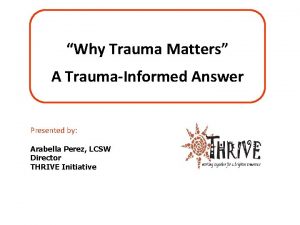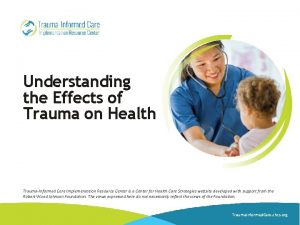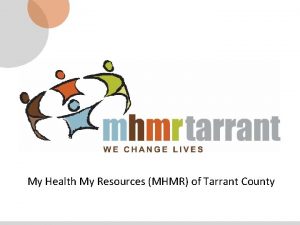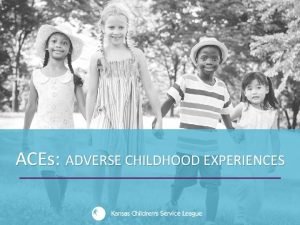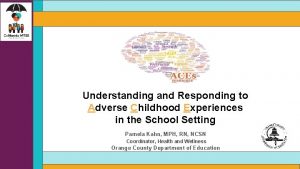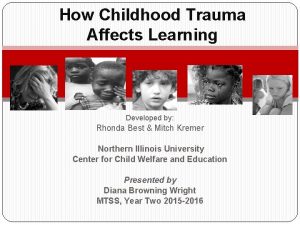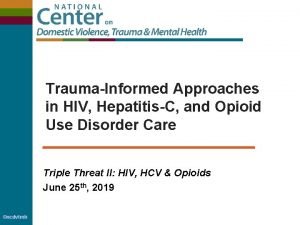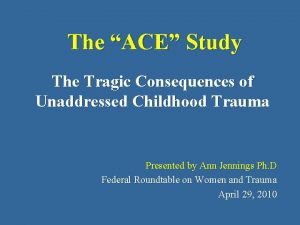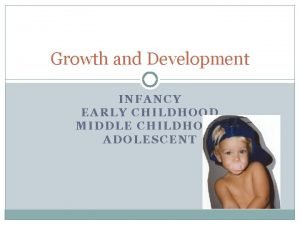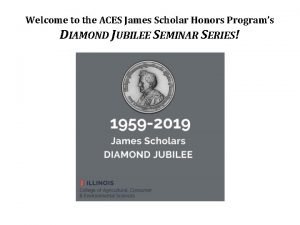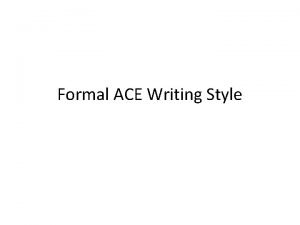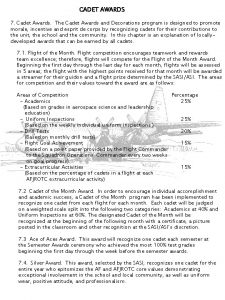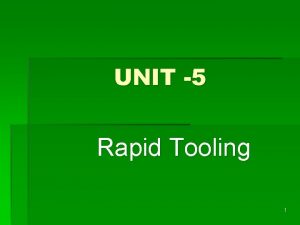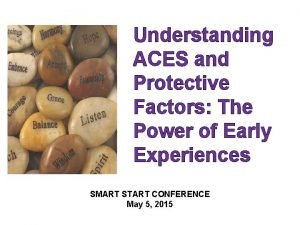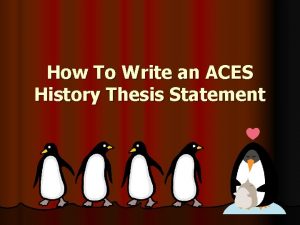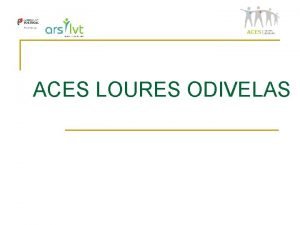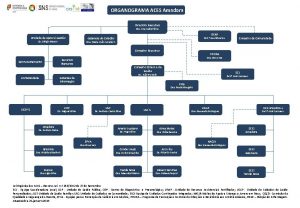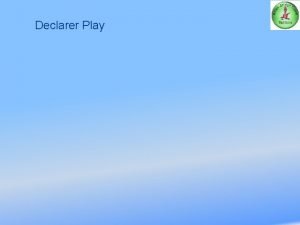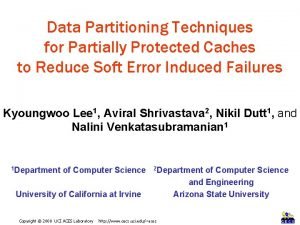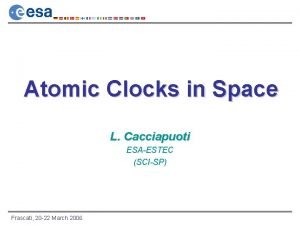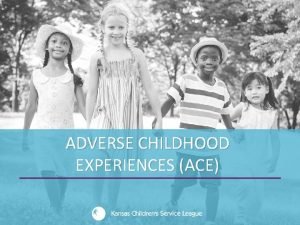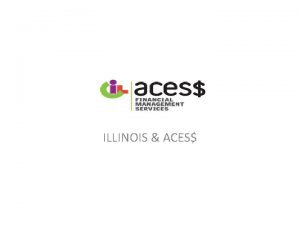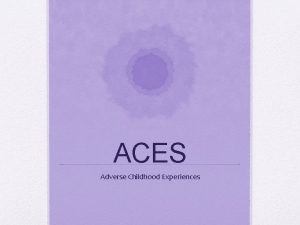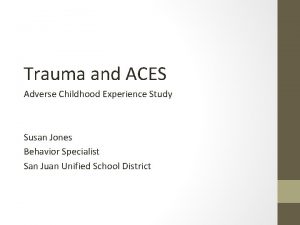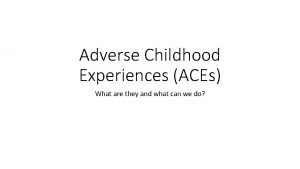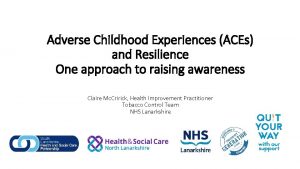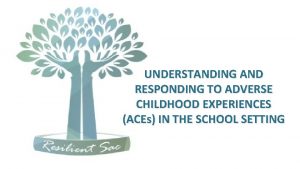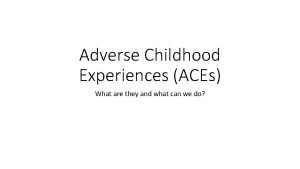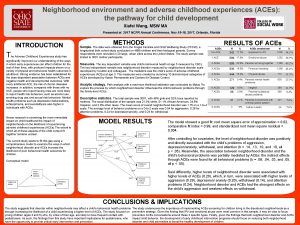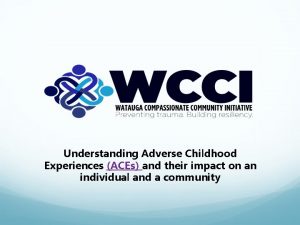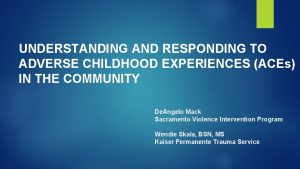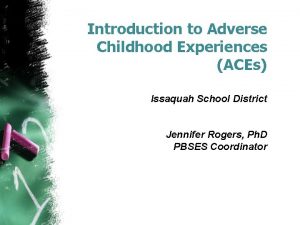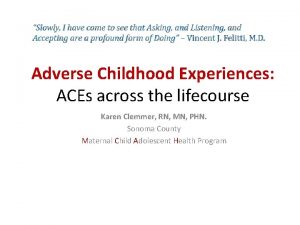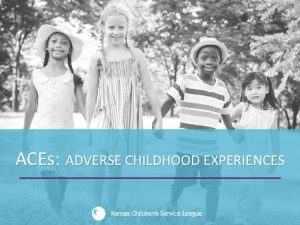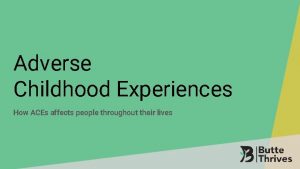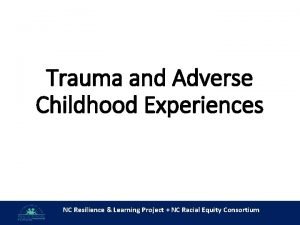Adverse Childhood Experiences ACEs and Trauma CHILDHOOD EXPERIENCES























- Slides: 23

Adverse Childhood Experiences (ACE’s and Trauma) CHILDHOOD EXPERIENCES ARE POWERFUL DETERMINANTS OF WHO WE BECOME AS ADULTS James Docherty

Trigger Warning! We are in a search for ‘understanding’, not the search for blame. So If we could possibly “suspend” – Judgement, blame, shame and accusation from the whole conversation around ACEs and Trauma And simply ask ourselves and each other; “What’s going on? ” “Why’s it going on? ” “What is my role in it? ” Then we can talk prevention, buffering & recovery?

ACEs and Trauma know no boundaries… REGARDLESS OF DEMOGRAPHIC AGE RACE BORDERS CULTURE GENDER STATUS

“As the ACE study has shown, child abuse and neglect is the single most preventable cause of mental illness, the single most common cause of drug and alcohol abuse, and a significant contributor to leading causes of death such as diabetes, heart disease, cancer, stroke, and suicide. ” ― Bessel A. van der Kolk. The Healing of Trauma

Psychoeducation is an evidence-based therapeutic intervention and education tool for individuals and their loved ones that provides information and support to better understand cope with living with trauma (Toxic stress) and or supporting recovery. It can provide a more thorough understanding on the nature of Adverse Childhood Experiences/trauma prevention and recovery. “Get this information to the general population and they will invent very wise actions”

“It’s NOT, what’s wrong with you? ” Judgment Blame Shame Punishment “It’s, WHAT happened to you? ” Empathy Compassion Understanding Nurturing Healing/Recovery

Our response is key. Non. Trauma Informed Response Trigger Negative Outcome Trauma Informed Response Positive Outcome

Triggers • Triggers include seeing, feeling, or hearing something that remind us of past trauma. (Coercive energy) • Triggers activate the alarm system. (Stress Response) • When the alarm system is activated, but there is no danger, it is a false alarm. • The response is as if there is current danger.

Positive Stress Response Brief increases in heart rate Mild elevations of stress hormones Examples: • Dropping off at School • Losing a football game • Overcoming fear of swimming Possible consequences: Development of a sense of mastery that is critical for healthy development

Tolerable Stress Response • More prolonged activation of the stress response system • Examples: • Exams • Death of a loved one • Persistent discrimination • Frightening accident • Possible consequences: • Range from positive to harmful depending on relationships, the environment, prior experiences, and lack of emotional buffering

Toxic Stress Response Prolonged activation of stress response systems Examples: • Physical or emotional abuse • Chronic neglect • Exposure to violence • Extreme poverty Possible consequences: Lifelong impacts on brain architecture and other parts of the body’s stress response system that increase the risk of stress-related physical and mental illness later in life

“Trauma can be a single event, connected series of traumatic events or chronic lasting stress. ” Diagnostic Classification: 0 -3 R Trauma is ‘EVERYWHERE’ and vastly under -recognised

We all have buttons that can be pushed… Who’s in charge of self-care and happiness in your workplace? We have roles for everything else!!

Taking care of yourself Self-care checklist: • • • Physical fitness Nutrition and hydration Sleep and rest Assertiveness skills Centering and solitude Creative activities Fun and enjoyment Support provided ---- Emotional supervision Support received Set and monitored goals Meditation/Yoga/Pilates What else?

A high dose of adversity is when people live with more fear than hope…

Preventing adversity, buffering adversity and fostering resilience is when people live with more hope than fear…

“Don’t get trapped in what happened, provide what is often missing!” The presence of an emotionally available, non-stressed, attuned, nondistracted safe care givers (Preferably Adults) is a reason why kids with high ACE scores are doing better than some with a low score! It’s not always what happened, it’s what was missing when it did happen! The Great British Child Psychiatrist D. W. Winnicott said: That fundamentally two things go wrong in childhood. One is when things happen that shouldn’t happen and then there’s things that should have happened but didn’t. “It’s all about relationships” Look for who’s doing relationship?

- Dr Bruce Perry Senior Fellow, Child Trauma Academy

What can we learn from listening to the voices of people who have experienced trauma? That adversity is not destiny That recovery and healing is possible with the right support in the right environments (That’s where our collective power lies as a society) That each individual is unique That trauma informed is a “way of being” in the world, it’s not a qualification or a tick box exercise That trauma informed practice is not informed unless it’s informed by survivors. If we are not doing it with them, then we are doing it to them. (A dynamic that breeds conflict, and damages trust in relationship) We are inside your organisations, there is “no us and them”. Share experience of people places and things that enabled resilience and recovery That trauma is a wound that can heal, but it leaves a scar! There’s no fully moving on from a trauma wound. Life, smells, sounds, noises, people, and events always remind you… it was real!

If we don’t intervene early in the prevention, recovery and buffering of Adverse Childhood Experiences, then we will continue to see the “symptoms” played out in devastating fashion, in our homes, our schools, our streets, our prisons, in our hospitals, our bodies, our emotions and our minds. “We need to get it right for the parent’s in order to get it right for the children. ” - James Docherty

Investing • The issue is not are we going to pay - - - it’s are we going to pay now, up front, or are we going to pay a whole lot more later on. - Marian Wright Edelman

“It Takes a Community” The social and health consequences that underscore the importance of preventing and buffering ACEs are glaring. We require a complete paradigm-shift, a way of seeing ACEs not as a moral issue or parental failure, and certainly not a legal concern, but as a fundamentally human problem whose roots go back to our core experiences and needs as human beings. Safe, stable and nurturing relationships and environments that enable people to reach their full potential. Strategies that address these needs include: Intimate partner violence prevention Mental illness and substance abuse treatment Basic cause of drug addiction is experiencedependent, not substancedependent Sufficient Income support for lower income families. Poverty a major cause of stress on family system High quality child care, Prevention should involve providing emotionally nourishing environments in day-care nurseries, primary and high schools Social support for parents enhances quality of life and provides a buffer against adverse life events Family support programs, group work. Prevention must involve identifying and working with young children and adolescents at risk What can ‘We Do’? The prevention of ACE's needs to begin at the first prenatal visit. Stresses on pregnant women already a predictor in shaping the brain of a developing child. Psychoeducation on toxic stress! More health visitors for pregnant women and families with new-borns Teenage support programs for teens and teen pregnancy, Voluntary home visit programmes support by strengthening maternal parenting practices. Quality of home environment essential to healthy child development

Reference: ACES Publications (from the CDC ACE Study Web site, where you can search this list by year or health outcomes. ) https: //acestoohigh. com/research/ Childhood Disrupted: How Your Biography Becomes Your Biology and How You Can Heal, by Donna Jackson Nakazawa. The Body Keeps the Score: Brain, Mind and Body in the Healing of Trauma, by Bessel Van Der Kolk. The Deepest Well: Healing the Long-Term Effects of Childhood Adversity, by Dr Nadine Burke Harris, 2018. Dr Gabor Maté: A New Understanding Of Addiction. Https: //networkmagazine. Ie/articles/gabor-mat%c 3%a 9 -new-understanding-addiction IT’S NOT THE DRUGS. IT’S THE (ACEs) ADVERSE CHILDHOOD EXPERIENCES. https: //acestoohigh. com/2017/05/02/addiction-doc-says-stop-chasing-the-drug-focus-on-aces-people-can-recover/ The Boy who was Raised as a Dog: And Other Stories from a Child Psychiatrist's Notebook : What Traumatised Children Can Teach Us about Loss, Love, and Healing. – Dr Bruce Perry https: //books. google. co. uk/books/about/The_Boy_Who_Was_Raised_as_a_Dog. html? id=WW 5 u. Dg. AAQBAJ&printsec=frontcover&source=kp _read_button&redir_esc=y#v=onepage&q&f=false https: //www. amazon. co. uk/Hold-Your-Kids-Parents-Matter-ebook/dp/B 07 DK 2 CZ 2 V/ref=dp_kinw_strp_1 Hold on to Your Kids: Why Parents Need to Matter More Than Peers – Dr Gordon Neufeld and Gabor Maté J. L, Herman. Trauma and Recovery, 1992, New York Books https: //www. amazon. co. uk/Trauma-Recovery-Aftermath-Violence-Political/dp/0465061710
 Adverse childhood experiences study
Adverse childhood experiences study Adverse childhood experiences study
Adverse childhood experiences study Adverse childhood experiences study
Adverse childhood experiences study Adverse childhood experiences powerpoint
Adverse childhood experiences powerpoint Slidetodoc.com
Slidetodoc.com Childhood trauma discussion questions
Childhood trauma discussion questions What is childhood trauma
What is childhood trauma Ace study score
Ace study score Early and middle childhood
Early and middle childhood James scholar program
James scholar program Ace style paragraph
Ace style paragraph To be recognized as an “ace of aces” a cadet must
To be recognized as an “ace of aces” a cadet must Aces essay format
Aces essay format Keltool process
Keltool process Aces protective factors
Aces protective factors How to write an aces paragraph
How to write an aces paragraph Aces writing rubric
Aces writing rubric Centro de saude urmeira
Centro de saude urmeira Aces amadora
Aces amadora Aces check cashing
Aces check cashing Aces
Aces Aces
Aces Schoolsworkpro
Schoolsworkpro Aces$ online
Aces$ online
